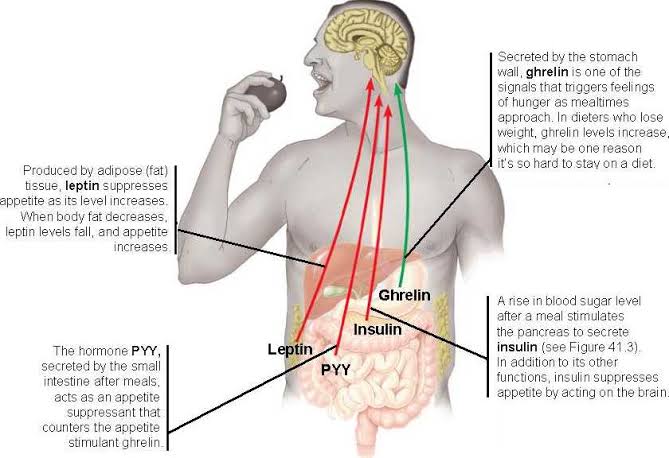
There is no doubt that hormones affect the general health of the body, as they are involved in many important vital processes in the body. Leptin is one of the hormones directly related to body fat and obesity. The hormone leptin sends signals to the hypothalamus in the brain. This hormone helps regulate and alter long-term food intake and energy intake and not just from one meal to the next. Thus, leptin is the hormone responsible for helping the body maintain its weight. In this article, we will explain to you what the hormone leptin is and what is leptin resistance.
leptin hormone:
Leptin is secreted from fat cells that are found in adipose tissue. Thus, the amounts of leptin are directly related to the amount of fat in the body. If an individual increases body fat, the levels of leptin in the body will increase. Whereas, if an individual reduces their body fat percentage, their leptin levels will also decrease.
The functions of the hormone leptin in the body:
Leptin is sometimes called the satiety hormone. As it helps prevent and fill hunger and regulates the energy balance in the body, so the body does not cause hunger responses when it does not need energy. However, when hormone levels drop, which occurs when an individual loses weight, the lower levels can lead to a significant increase in appetite and food cravings. This in turn can make losing weight more difficult.
Sweat on the causes of constant hunger, which predicted something dangerous .
The effect of leptin on the brain:
Leptin is produced by fat cells in the body. The higher the percentage of fat in the body, the higher the production of leptin.
Leptin is transported through the bloodstream to the brain, where it sends a signal to the hypothalamus (the part that controls when and how much food is eaten).
Fat cells use leptin to tell your brain how much fat is in the body. High levels of leptin tell your brain that you have a lot of stored fat, while low levels tell the brain that fat stores are low and that you need to eat.
When you eat, your body fat increases, resulting in higher leptin levels. So you eat less and burn more. Conversely, when you do not eat your body fat percentage decreases which results in lower levels of leptin. So in this stage you eat more and burn less.
This type of system is known as a negative feedback loop and resembles the control mechanisms of many different physiological functions, such as breathing, body temperature and blood pressure.
Leptin resistance:
People who are obese have a lot of fat in their fat cells. Because fat cells produce leptin in proportion to their size. People who are obese also have very high levels of the hormone leptin.
Given the way leptin is supposed to work, many obese people should limit their eating normally. Their brain must know that they have a lot of stored energy.
However, their leptin signaling may not work. Although there are high levels of leptin, the brain does not see it.
This causes your brain to change its behavior in order to regain body fat. Then your brain encourages the following actions:
- Eating more: The brain believes that you must eat in order to prevent the feeling of starvation.
- Reduced energy expenditure: In an effort to conserve energy, your brain lowers your energy levels and makes you burn fewer calories at rest.
Thus, eating more food and exercising is not the primary cause of weight gain. It is a possible result of leptin resistance, a hormonal imbalance.
For most people with leptin resistance, being psychologically prepared to overcome a leptin-induced hunger signal is nearly impossible.

leptin hormone
The effect of leptin resistance on dieting:
Leptin resistance may be one reason why many diets fail to promote long-term weight loss. If you suffer from leptin resistance, losing weight will still reduce fat mass, resulting in a significant reduction in leptin levels. But your brain does not necessarily reflect leptin resistance.
When the hormone leptin is low, it leads to hunger, increased appetite, reduced motivation to exercise, and a reduced number of calories burned while resting. Then your brain thinks it’s too hungry and starts various powerful mechanisms to get back that lost body fat.
Causes of leptin resistance:
1Inflammation:
Inflammatory signals in the hypothalamus may be an important cause of leptin resistance in both animals and humans.
2Free fatty acids:
Elevated free fatty acids in the bloodstream may increase lipid metabolites in the brain and interfere with leptin signaling.
3High levels of leptin:
High levels of leptin in the body is one of the main causes of leptin resistance.
Can leptin resistance be reversed?
The best way to know if you have leptin resistance is to look in the mirror. If you have a lot of body fat, especially in the abdominal area, you are definitely suffering from leptin resistance. Some researchers believe that reducing diet-induced inflammation may help reverse leptin resistance. There are some things that can be done which include the following:
1Avoid eating processed foods:
Processed foods may compromise the integrity of the gut and cause inflammation.
2Eat soluble fiber:
Eating soluble fiber helps improve gut health and may protect against obesity.






